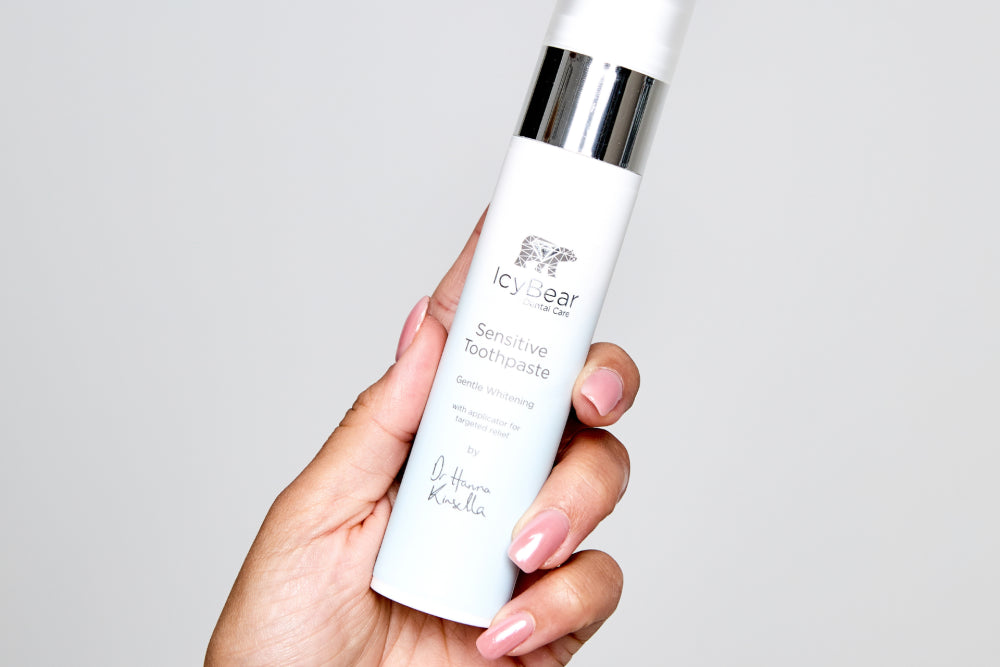Sensitive Teeth Pain? Here’s What Causes It & How to Fix It

We've all experienced it—taking a sip of a cold drink or biting into something hot, only to feel that sharp, uncomfortable jolt in our teeth. Tooth sensitivity is a common issue affecting millions, turning everyday activities into painful moments. But what causes it? More importantly, how can you fix it? Let’s explore the key triggers and the best ways to strengthen your tooth enamel while maintaining a healthy oral hygiene routine.
What Causes Sensitive Teeth Pain?
1. Worn-Down Tooth Enamel
Your enamel acts as a protective layer for your teeth. However, acidic drinks, sour foods, and aggressive brushing can wear down enamel over time, exposing the dentine underneath. This makes your teeth more vulnerable to pain, especially when consuming cold foods or sweets.
2. Gum Recession & Exposed Tooth Roots
Your gum tissue is designed to protect the tooth roots, but certain health conditions, ageing, and overbrushing can cause gum recession. Once your tooth roots are exposed, sensitivity to cold, heat, and even air becomes more common.
3. Plaque Buildup & Enamel Erosion
Neglecting your oral hygiene routine allows plaque buildup, which weakens the tooth surface and accelerates enamel erosion. This not only increases tooth sensitivity but can also lead to cavities and decay.
4. Tooth Grinding (Bruxism)
Many people unknowingly grind their teeth at night. Over time, tooth grinding wears down enamel, making your teeth more sensitive and prone to fractures.
5. Toothbrush Abrasion from Hard-Bristled Toothbrushes
Using hard-bristled toothbrushes or brushing too aggressively can cause toothbrush abrasion, leading to enamel erosion and gum irritation. Switching to a soft-bristled toothbrush or electric toothbrushes with pressure control can prevent further damage.
6. Recent Dental Work
If you've recently had fillings, crowns, or root canals, temporary tooth sensitivity is normal. However, if you experience persistent sensitivity, consult your dentist to ensure there are no complications.
How to Fix Sensitive Teeth Pain
1. Use a Fluoride Toothpaste for Sensitivity
Switching to a fluoride toothpaste designed for tooth sensitivity can help rebuild tooth enamel and provide long-lasting protection.
2. Brush Gently with a Soft-Bristled Toothbrush in Circular Motions
Avoid toothbrush abrasion by brushing in circular motions with a soft-bristled toothbrush or using electric toothbrushes with gentle settings. This helps maintain good oral health without damaging your tooth surface.
3. Avoid Acidic & Sugary Foods
Reducing your consumption of highly acidic foods—such as citrus fruits, sour foods, and acidic drinks—helps prevent enamel erosion. After eating acidic foods, rinse with warm water instead of brushing immediately to avoid further damage.
4. Wear a Mouthguard if You Grind Your Teeth
A mouthguard can protect your teeth over time by preventing further tooth grinding, which contributes to enamel erosion.
5. Follow a Strong Oral Hygiene Routine
Brushing twice a day, flossing, and using fluoride toothpaste ensures long-lasting protection for your oral health. Regular dental check-ups help prevent plaque build-up and spot early signs of sensitivity.
6. Try Fluoride Treatments for Extra Protection
If your tooth sensitivity is severe, professional fluoride treatments can help strengthen tooth enamel and provide long-lasting protection.
Looking for a Whitening Toothpaste That’s Gentle on Sensitivity?
Want a brighter smile without worsening sensitivity? Icy Bear’s Teeth Whitening Toothpaste is specially formulated to strengthen enamel, reduce sensitivity, and gently whiten teeth with the power of diamond dust.
FAQ's
How long does it take for sensitive teeth to improve?
The timeframe for improvement depends on the cause of the sensitivity. If enamel erosion or plaque buildup is the issue, using a fluoride toothpaste for tooth sensitivity can provide relief within a few weeks. However, if gum recession has exposed your tooth roots, it may take longer for sensitivity to reduce. Consistently following a strong oral hygiene routine and avoiding acidic drinks or sour foods will help speed up recovery. If pain persists, a dentist may recommend fluoride treatments or other solutions.
Can stress cause sensitive teeth?
Yes, stress is a common issue linked to tooth sensitivity, mainly due to tooth grinding (bruxism). Grinding your teeth at night can wear down the protective layer of tooth enamel, leading to discomfort. Over time, this can cause dentine exposure, increasing pain when eating cold foods or sweets. Using a mouthguard at night and practising relaxation techniques can help prevent further damage. If grinding is severe, your dentist may recommend a custom-fitted mouthguard for extra protection.
Should I avoid whitening toothpaste if I have sensitive teeth?
Not necessarily! Some whitening toothpastes can be too harsh, but a gentle, fluoride toothpaste designed for tooth sensitivity can strengthen tooth enamel while brightening your smile. Icy Bear’s Teeth Whitening Toothpaste enriched with fluoride and one carat of finely ground diamond dust, it gently polishes and whitens teeth without damaging enamel. It’s also enamel-safe and fluoride-infused, making it a great choice for those with persistent sensitivity. If you have extreme sensitivity, you may want to alternate with a toothpaste specifically for sensitive teeth.
Why do my teeth hurt after eating cold foods?
If cold foods trigger sharp pain, it could be due to enamel erosion, plaque buildup, or exposed tooth roots from gum recession. When the protective layer of enamel is worn down, temperature changes can directly affect the nerves inside your teeth. Using fluoride toothpaste, avoiding hard-bristled toothbrushes, and brushing in circular motions with a soft toothbrush can help reduce tooth sensitivity. If the pain is severe or persistent, your dentist may recommend fluoride treatments or desensitising toothpaste.
Can regular toothpaste help with sensitive teeth?
While regular toothpaste cleans teeth, it doesn’t offer the same long-lasting protection as a fluoride toothpaste formulated for tooth sensitivity. Toothpastes designed for sensitive teeth help to block pain signals and rebuild tooth enamel over time. If you experience persistent sensitivity, switching to a specialist toothpaste can help shield the tooth surface while reducing discomfort. Pairing it with a strong oral hygiene routine will provide the best results.



